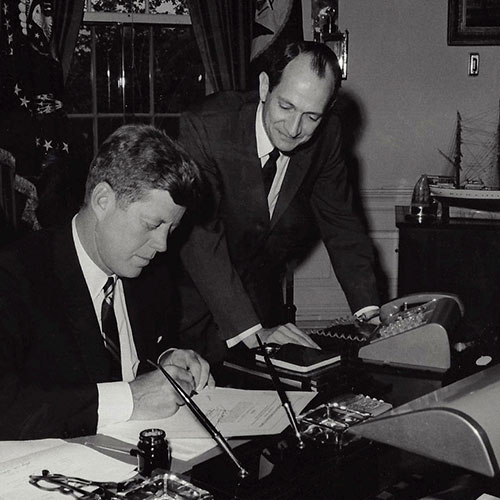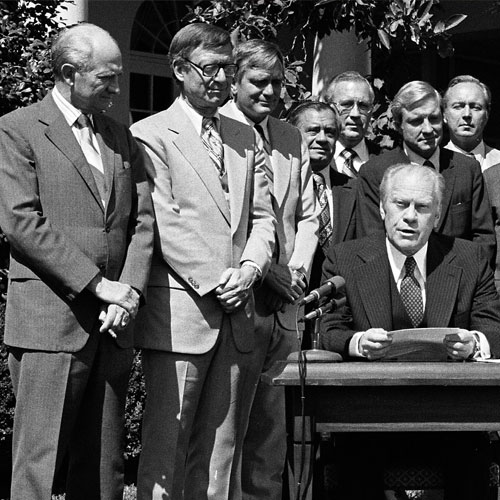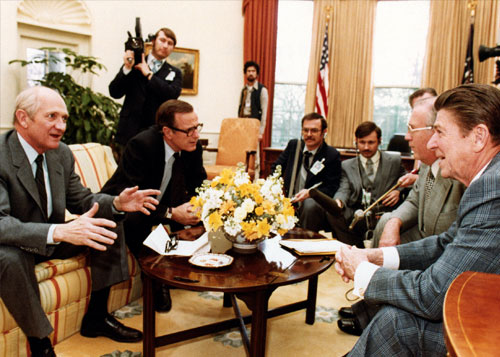“Constructive change doesn’t come just because you think that something isn’t right…it is tough, tedious work…I’ve tried to change a thousand things in government and only managed a few.”
–Jack Brooks
Congressman Jack Brooks worked alongside ten presidents in his over his 42 years of public service. Known as The Chairman, The Executioner and the Snake Killer, Brooks’ blunt manner, steadfast values, and brilliant political mind made him an invaluable asset to America.
With his trademark cigar, Brooks’ no-nonsense, bipartisan approach to creating change, influenced the direction of Congress and improved government standards. Saving the International Space Station with a single vote, one of the few Southern politicians who refused to sign the infamous ‘Southern Manifesto’, and effectively helping to shape the computer industry as we know it today, also, as a member of the Nixon impeachment committee Brooks and his excellent staff drafted the original Articles of Impeachment. Jack Brooks’ impact was so institutionally renowned that many describe him as one the most influential men Americans need to know.
Brooks understood compromise in lawmaking as one of the most critical functions for effective governing and essential for the long-term health of the country. For this very reason, presidents such as Johnson, Carter, and Clinton sought his counsel and assistance to pass transformational legislation such as the Great Society programs, sweeping governmental cost reduction, and gun reform that still shape our society.
Brooks was a tireless defender of the rights and interests of both his constituents and the American people at large. He was a Democrat, but not a demagogue and he didn’t abuse his position for personal gain; temptations which seem to perpetually plague many of our current representatives. Brooks represents the best of The Greatest Generation. Following WWII, the U.S. enjoyed 40 years of steady and sustainable economic growth, which ended in 1994, the same year Jack Brooks lost re-election. America has never regained the confidence and strength it had during those post-war years under rational Democratic leadership. This Biography is the story of one man’s unique political journey, but it may also serve as a guide back to a time of common purpose in the hopes of inspiring the current and future leaders of America.
When people would remark to Rep. Brooks on his serving under ten U.S. presidents during his 42 years in Congress, he was quick to cut them off. “No,” he would say, “I served with ten presidents.”
–Jack Brooks
1953: President Harry Truman

As Brooks became ensconced in the House, he began hosting a biennial Freshman breakfast to welcome new members of the House to Washington. For one particular breakfast in the late 1950s, Brooks invited Truman to attend, who happily accepted and even followed up with thank-you note.
1955: President Dwight Eisenhower
Brooks led an investigation of a GSA contract at a Cuban nickel mine as a part of a small subcommittee. This committee earned him respect as a no-nonsense politician amongst both Republicans and Democrats.
1960: President John Kennedy

When John Kennedy’s East Coast based campaign people wanted to come down to Beaumont, now that Texas was in play after Johnson had joined the ticket, Brooks flatly told them (RFK most likely) absolutely not. He himself would deliver his district for the Democrats, which he did by the exact same margin that Texas went for Kennedy overall. While Kennedy went on to defeat Nixon by a comfortable margin, Brooks certainly held up his end.
1963: President Lyndon Johnson

Huddled inside Air Force One, it was Brooks who convinced Lyndon Johnson that the Oath of Office needed to happen before leaving Dallas. Just a year after the Cuban Missile Crisis, many people counseled the Vice President that neither the country nor the world could not go without a Commander-in-chief or the Leader of the Free World, even for a few hours. But was Brooks who added critical additional warning to LBJ that finally ended the discussion and made history.
During the next five years, Brooks and Johnson collaborated to create and pass the Great Society legislation, making it the most productive legislative period since the New Deal. Brooks co-drafted the Civil Rights and Voting Rights Acts with Emanuel (Manny) Celler and wrote legislation that helped to define the nascent IT industry and successfully negotiated critical infrastructure projects that have saved the federal government billions of dollars.
1974: Richard Nixon

Nixon referred to Brooks as “The Executioner.” That’s because he knew whose hands were really the axe. It was Congressman Brooks, and his excellent staff of dedicated civil servants, who did the hard work of drafting all the Articles of Impeachment, and even then, from just what was known at the time.
1975: President Gerald Ford

Brooks had the opportunity to go after the newly elected President Gerald Ford for errors in his personal income tax filings. Brooks had just led an investigation into Nixon for $17 million in taxpayer-funded upgrades to his California home, and would not be deterred due to power or privilege. Nevertheless, Chairman Brooks decided not to pursue an inquiry, nor did he state anything publicly about the matter. Although it might have been politically advantageous for him, or the Party, to do so he also knew that Ford was a decent man and that the errors had not been made due to recklessness or greed. Chairman Brooks acted, or in this case, chose not to act, for the good of the Country. Nixon was a criminal, and needed to be prosecuted, but it would have been a terrible waste to put the Country through another Constitutional Crisis all because of clearly unintended error.
1977: President Jimmy Carter

Carter came into office with an aggressive agenda to reorganize the federal government without letting anyone stand in his way. Jack Brooks stood in his way. Carter eventually learned to change tactics and soon came to depend on Brooks’ support in the House to pass anything in his agenda, especially a bill that would create a federal department for Education.
1988: President Ronald Reagan

Under the Reagan Administration, the U.S. Intelligence Agency kept a “black list” of persons deemed unsuitable for government-sponsored speaking trips outside the country. Among those listed was Jack Brooks. Brooks, who had recently been twice elected to serve as president of the NATO Parliamentary Assembly, found this irony typical of an administration that violated both The Constitution and an Act of Congress.
1989: President George H.W. Bush

Brooks knew Bush well from their time together in the House Texas delegation. Their relationship was one of mutual respect. Bush, even once President, always referred to Brooks as “Mr. Chairman.”
1994: President Bill Clinton

Clinton references Brooks three times in his memoir, “My Life,” both because the man was one of his favorite congressmen and because he should have listened to the Texan when he warned Clinton about including the assault weapons ban in his 1994 Violent Crime Bill. Brooks, who crafted that enormous piece of legislation and navigated it to passage through an obstinate House, told Clinton repeatedly that there would be hell to pay for 30 or 40 Democrats in conservative districts if the ban made it into the final version. Clinton didn’t listen to the Congressman and notes in his memoir that he still regrets it to this day.




